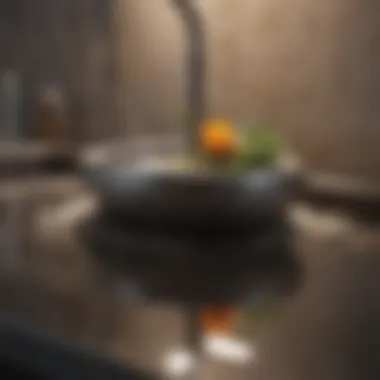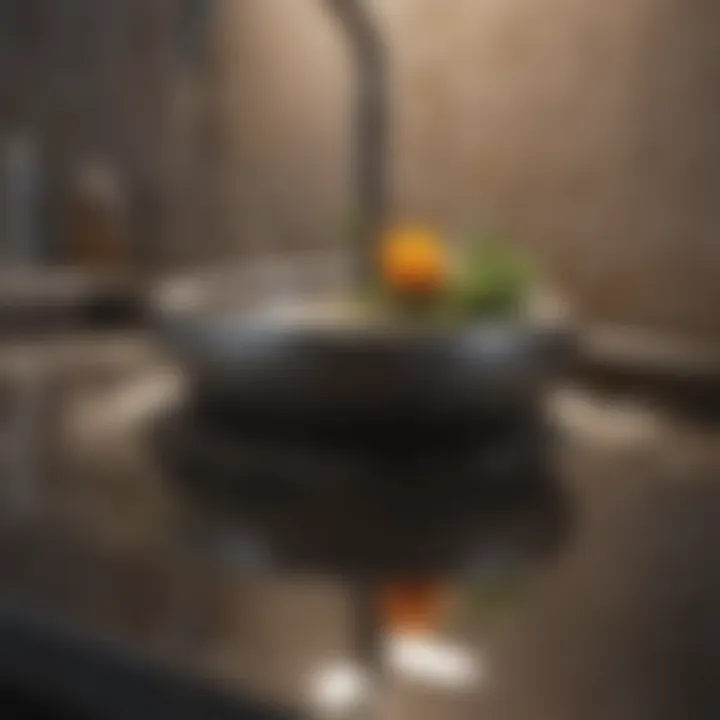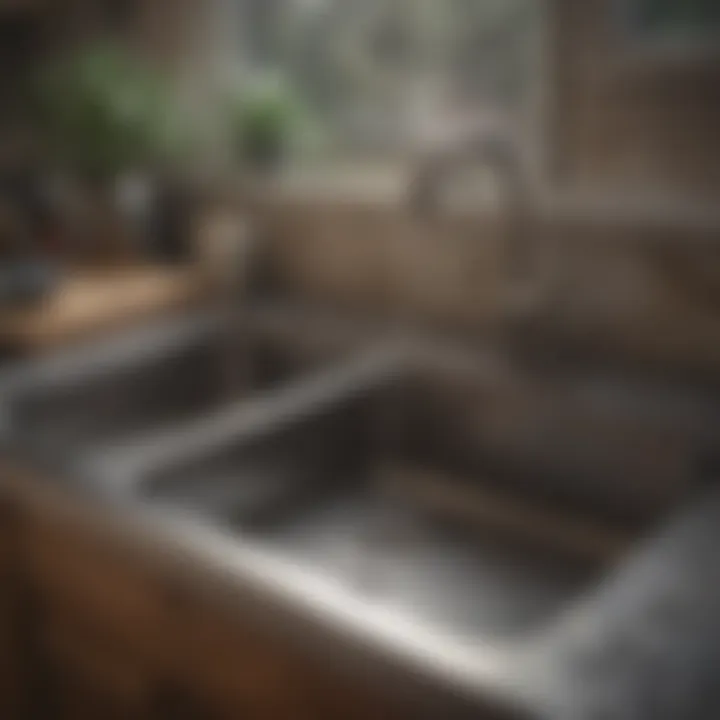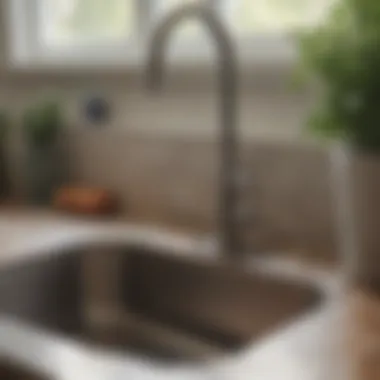Natural Ways to Clean Your Kitchen Sink Drain


Intro
Keeping a kitchen sink drain clean is essential for maintaining a fresh and healthy home environment. Over time, food particles, grease, and other debris can accumulate in the drain, leading to unpleasant odors and potential blockages. Many people reach for chemical cleaners, but these can harm both the environment and your plumbing. Therefore, exploring natural cleaning methods is not only practical but also eco-friendly. This guide aims to provide homeowners with effective techniques and ingredients to keep their kitchen sink drains clear and odor-free without relying on harsh chemicals.
In this article, we will delve into natural methods that utilize common household ingredients. We will also discuss preventative measures to help maintain a clean drain and the long-term benefits of adopting these practices. The goal is to equip you with the knowledge to make informed choices about cleaning your kitchen sink drain naturally.
Prolusion to Natural Drain Cleaning
In the realm of home maintenance, the cleanliness and functionality of kitchen sink drains often go unnoticed. However, neglected drains can lead to unpleasant odors, clogs, and even costly plumbing repairs. This article emphasizes the significance of natural drain cleaning methods, which offers a proactive approach to maintaining hygiene in the kitchen.
Natural methods of cleaning kitchen sink drains are crucial for several reasons. Firstly, they utilize readily available ingredients, reducing dependency on commercial chemical cleaners that can be harsh on both the environment and our health. The consequences of using chemical drain cleaners extend beyond just the potential harm to our plumbing; they can release toxic substances into the air and waterways.
Moreover, natural cleaning solutions are effective and safe. Ingredients like baking soda, vinegar, and lemon juice not only break down food particles and grease but also leave the drain smelling fresh. These substances have proven antibacterial properties, which assist in ensuring that bacteria do not flourish in neglected spaces. This is especially important in environments where food is prepared and consumed.
Considerations regarding natural drain cleaning also include accessibility and simplicity. Many homeowners can create effective cleaning solutions without the need for specialized products. This ease encourages individuals to adopt routine maintenance practices as part of their household cleaning schedule.
"Regular maintenance of kitchen drains can prevent more significant issues down the line, saving time and money."
Additionally, natural cleaning methods align with sustainable living practices. By choosing eco-friendly solutions, homeowners contribute positively to their environmental impact. The shift towards sustainable methods in everyday tasks reflects a broader societal trend towards greener living.
Understanding Drain Clogs
Understanding drain clogs is crucial for maintaining a functional and healthy kitchen sink. Clogs can lead to unpleasant odor, slow drainage, and even severe plumbing issues. The kitchen sink is often a gathering spot for various food particles and debris, making it a prime location for clogs. This section will explore the common causes of these blockages and provide insight into identifying the signs of a clog early.
Common Causes of Clogs
Several factors contribute to kitchen sink clogs, and it’s essential to recognize them to prevent future problems. Here are some of the most common causes:
- Grease Buildup: When cooking, grease often ends up in the sink. Over time, it can solidify and cling to the pipes, causing blockages.
- Food Particles: Scraping dishes into the sink may leave behind small particles that can accumulate over time, blocking the drain.
- Soap Residue: Regular use of soaps and detergents can result in a sticky residue that sticks to the pipe walls, creating clogs.
- Hair: Although more common in bathroom drains, hair can also find its way into the kitchen sink, especially if washing hands or food ingredients there.
- Foreign Objects: Occasionally, items like utensils or small objects may accidentally fall into the sink, causing immediate blockages.
Signs of a Clogged Drain
Identifying a clogged drain early can save homeowners significant trouble and expenses. Here are signs indicating that your kitchen sink may be clogged:
- Slow Drainage: If water is not draining quickly and is pooling in the sink, it is often the first sign of a clog.
- Unusual Sounds: Gurgling noises coming from the sink may indicate trapped air in a blockage.
- Bad Odors: Persistent unpleasant smells can emanate from food debris trapped in the drain.
- Backflow: If water backs up into the sink when running another faucet or during dishwashing, this can signify a more serious clog.
"Addressing clogs early can prevent larger plumbing issues down the line."
By understanding these elements related to drain clogs, homeowners can be more proactive about their kitchen maintenance, ensuring drains remain clear and functional.
The Importance of Regular Drain Maintenance
Regular drain maintenance is essential in ensuring that the kitchen sink functions properly. Maintenance can help prevent the buildup of debris that leads to serious clogs. When homeowners neglect their drains, they risk creating an environment where unpleasant odors can develop, and even worse, water can back up into the sink. Regular attention to drain health can save time and money in the long run.
Benefits of Clean Drains
- Efficient Water Flow: Clean drains promote better drainage. Water flows freely, reducing the likelihood of clogs and backups. This simple effect improves overall kitchen hygiene.
- Odor Reduction: Dirty drains often emit foul smells, a result of decomposing food particles and stagnant water. Cleaning methods can eliminate these odors effectively.
- Cost Savings: By maintaining drains regularly, homeowners can avoid expensive plumbing bills. Prevention is often cheaper than the repairs needed when fixing a clogged or damaged drain.
- Health Quality: An unclogged drain contributes to a healthier kitchen environment. It minimizes the risk of mildew and mold, which can develop in stagnant water and contribute to health problems.
Environmental Impact of Chemical Cleaners
Chemical drain cleaners can be highly effective but they often come at a cost to the environment. Many of these products contain toxic substances that can irritate skin and respiratory systems. When these chemicals enter the water supply, they can harm aquatic life and disrupt ecosystems. Additionally, over time, frequent use can deteriorate the plumbing, leading to more leaks and issues.


Natural cleaning solutions, on the other hand, pose little to no environmental risk. Utilizing substances like baking soda, vinegar, and lemon juice provides effective cleaning without chemical fallout. Take a step back to consider the implications of chemical usage:
"Embracing natural cleaning alternatives not only protects the immediate environment but also safeguards plumbing longevity."
Switching to natural methods allows homeowners to maintain clean drains while supporting sustainable practices. This not only benefits their household but the larger ecosystem as well.
Understanding the importance of a clean kitchen sink drain highlights both practical benefits and eco-friendly choices. Regular maintenance can ensure a healthy, efficient kitchen while reducing the harmful impact of conventional chemical cleaners.
Natural Ingredients for Drain Cleaning
The topic of natural ingredients for drain cleaning is essential in creating an eco-friendly household. It addresses the need for safe alternatives to harsh chemical cleaners, which can be harmful not just to the environment but also to human health. Using natural ingredients reduces the release of toxins into the water supply, helping to maintain the ecosystem.
These ingredients are commonly found in homes, making them accessible for regular maintenance. They offer effective cleaning solutions that not only remove blockages but also prevent odors and buildup. Here are some key natural ingredients that can be utilized for effective drain cleaning.
Baking Soda: A Versatile Cleaner
Baking soda is highly versatile and one of the most effective natural cleaning agents. It is a mild abrasive that helps to scrub away grime and grease. When mixed with water, it produces a gentle yet effective paste that can penetrate clogs without causing damage to pipes. Baking soda also neutralizes odors, making it particularly useful for kitchen drains.
To use baking soda for drain cleaning, simply pour half a cup down the drain. Follow it with hot water to activate its cleaning properties. This method not only helps remove existing clogs but also acts as a preventive measure.
Vinegar: Nature's Deodorizer
Vinegar, especially white vinegar, is well known for its deodorizing properties. It can tackle odors at the source by breaking down food particles and grease that often lead to unpleasant smells. Additionally, vinegar can react with baking soda to create a foamy cleaning reaction, which can help dislodge stuck material in the pipes.
To clean your drain, pour one cup of vinegar down after using baking soda. Let it sit for about 30 minutes before flushing with hot water. This combination can be very effective in maintaining a clean drain.
Salt: An Abrasive Yet Gentle Solution
Salt is an excellent abrasive cleaner that can assist in removing debris without damaging your plumbing system. It can be particularly effective when used in combination with hot water or vinegar. Salt works to break down greasy buildup and helps prevent clogs when used regularly.
To use salt, simply pour half a cup down the drain followed by boiling water. This dual action cleans and helps dissolve any grease, leaving your drains fresher and clearer.
Lemon Juice: Freshness in a Bottle
Lemon juice is not just a flavor enhancer; it also acts as a natural cleaner and deodorizer due to its acidic properties. The citric acid in lemon juice helps dissolve limescale and grease buildup. Additionally, it leaves a refreshing scent that can mask unpleasant odors.
For drain cleaning, pour half a cup of lemon juice down the drain followed by hot water. This method is perfect for a quick clean and helps keep your kitchen drain smelling fresh.
Using natural ingredients like baking soda, vinegar, salt, and lemon juice is not only simple but also effective. By incorporating these methods into your regular cleaning routine, you will ensure a clean environment while being mindful of the impacts on your health and the planet.
Step-by-Step Method for Cleaning Kitchen Sink Drains
Cleaning kitchen sink drains naturally is essential for maintaining a functional and odor-free kitchen. Utilizing a methodical approach ensures that every aspect of drain hygiene is covered. It can help avoid stubborn clogs from developing and extends the lifespan of your plumbing system. Here, we delve into a detailed step-by-step guide that emphasizes natural cleaning techniques, utilizing common household items.
Preparation for the Cleaning Process
Before beginning the cleaning process, it is crucial to gather necessary materials. Preparation lays the groundwork for an effective cleaning session. You will need:
- Baking soda
- White vinegar
- Salt
- Fresh lemon
- Hot water
- A plunger (optional)
- A drain snake (optional)
Start by ensuring the work area is clean and all items are available. Remove any large debris from the sink. This step aids in allowing cleaning solutions to reach the problematic areas directly. Additionally, ensure all dishes or utensils are picked up to maximize the effectiveness of the cleaning process.


Using Baking Soda and Vinegar
The combination of baking soda and vinegar is a powerful method for natural drain cleaning. Begin by pouring half a cup of baking soda down the drain. This ingredient acts as a gentle abrasive that helps loosen debris.
Next, follow with half a cup of white vinegar. The reaction between baking soda and vinegar creates bubbles, working to dislodge built-up dirt. Let this mixture sit for about 15 minutes. It’s best to avoid using the sink during this time, as you want the solution to engage with any blockages without interruption.
Cleaning with Salt and Lemon
After allowing the baking soda and vinegar to work, consider using salt and lemon for further cleansing. Pour a quarter cup of salt down the drain after rinsing the baking soda and vinegar. Salt is slightly abrasive and won’t damage your pipes. Squeeze the juice of half a lemon over the salt.
Leave the mixture for another 10-15 mins. Salt aids in breaking up grease while lemon juice brings a fresh scent and acts as an antibacterial agent. The acidity in lemon juice can enhance the cleaning process by further dissolving any remaining gunk.
Flush with Hot Water
After completing previous steps, flushing the drain with hot water is essential. Boil a kettle and slowly pour hot water down the drain. This helps wash away any loosened debris and remaining residue from the cleaning solutions used previously. It’s a significant final step that ensures your drain is clear and clean, promoting better flow.
Flushing not only removes what has been broken down but also helps eliminate any lingering odors. Doing this regularly can keep drains clear and reduce the chances of future clogs occurring.
Preventative Measures for Clog Prevention
Preventing clogs in your kitchen sink drain is just as important as cleaning them. A proactive approach can save both time and effort, keeping your plumbing system functioning smoothly. Here, we will examine why these measures matter and how they directly influence your household's overall upkeep.
Regular Maintenance Schedule
Establishing a regular maintenance schedule is key. By routinely checking and cleaning your sink, you reduce the chances of buildup. It is advisable to set aside time monthly for simple maintenance tasks. You can pour boiling water down the drain to help dissolve any minor blockages. Alternatively, using a mixture of baking soda and vinegar can also serve as a periodic treatment. Such actions provide a strong deterrent against future clogs, ensuring water flows freely.
What to Avoid Putting Down the Drain
Awareness of what should not go down the drain is critical for prevention. Grease, coffee grounds, and large food particles are common culprits of clogs. Dispose of grease separately, either in a container for solid waste or through specially designated disposal methods. Similarly, coffee grounds should be placed in the compost or trash, rather than rinsing them down the sink. If you see any food scraps lingering, consider using a trash bin instead. Making these simple changes in habits can drastically reduce clog occurrences.
Using Drain Screens
Installing drain screens can be a practical step in preventing clogs. These devices trap food particles and debris, preventing them from entering the pipes. They are easy to find and install, and they require minimal maintenance—just a quick rinse to clean them out periodically. By incorporating this straightforward tool in your kitchen sink routine, you create an effective barrier against unwanted drain blockages.
"An ounce of prevention is worth a pound of cure," especially when dealing with plumbing issues.
By being intentional and mindful about what enters your kitchen sink drain and maintaining a clear schedule, you can mitigate the potential for disruptive clogs. Engaging with these preventative measures not only maintains your plumbing but also contributes to a more efficient and eco-friendly household.
Alternative Natural Cleaning Solutions
In today's world, the need for environmentally safe and sustainable cleaning methods cannot be overstated. Traditional cleaning products often contain harmful chemicals that not only damage plumbing systems but also pose risks to human and environmental health. This section emphasizes the importance of looking for alternative natural cleaning solutions for your kitchen sink drain. By using safe, accessible, and effective methods, homeowners can maintain functionality while reducing their ecological footprint.
Natural ingredients often deliver effective results without environmental consequences. Whether through the use of essential oils or simple physical tools, these solutions maintain the integrity of a home while ensuring that it's safe for both residents and the planet.
Essential Oils as Natural Cleaners
Essential oils serve as potent natural cleaners not just for their fragrance but for their cleaning properties. Oils like tea tree oil or lavender oil have antibacterial and antifungal properties. This makes them reliable for keeping drains fresh and free from harmful microbes. Their use also helps in neutralizing unpleasant odors that can accumulate over time in kitchen sinks.
To utilize essential oils, add a few drops to your drain after cleaning it to help keep the area smelling fresh. Some popular oils to consider include:
- Tea tree oil: Known for its antibacterial properties.
- Peppermint oil: A natural deodorizer that keeps drains smelling fresh.
- Lemon oil: Its acidity not only provides a clean scent but also helps cut through grease and grime.


Combining these oils with other natural ingredients, like vinegar or baking soda, can enhance cleaning results. For instance, pouring a mixture of baking soda followed by warm water and a few drops of essential oil down the drain can help clear any lingering odors while ensuring a cleaner pipe system.
Using a Plunger and Drain Snake
For a more hands-on approach, using physical tools like a plunger or a drain snake can solve more stubborn clogs. This method should not be overlooked, especially when natural cleaning agents alone do not suffice. A plunger works by creating pressure to dislodge clogs, while a drain snake can physically remove blockages that are too tough for a liquid solution.
- To use a plunger effectively:
- On the other hand, when using a drain snake:
- Ensure there is enough water in the sink to cover the plunger’s rubber part.
- Place the plunger over the drain and create a tight seal.
- Push down and pull up quickly to generate pressure.
- Repeat several times until you feel the clog release.
- Insert the snake into the drain until you feel resistance.
- Rotate the handle to break apart the clog.
- Withdraw the snake carefully to avoid damaging pipes.
Both of these methods are effective means of clearing significant clogs and can often be done without the use of chemical cleaners.
"Utilizing natural cleaning solutions protects both your plumbing and the environment, paving the way for healthier living spaces."
In summary, alternative natural cleaning solutions provide a blend of safety and effectiveness for maintaining kitchen sink drains. By incorporating essential oils and tools like plungers and snakes, homeowners can address clogs without falling back on harsh chemicals. Advocating for such methods reflects not only good housekeeping practices but also responsible environmental stewardship.
The Role of Homeowners in Sustainable Practices
Homeowners hold a significant responsibility in promoting sustainable practices, especially when it comes to household maintenance such as cleaning kitchen sink drains. To maintain a clean and functional kitchen, it is essential to adopt environmentally friendly cleaning methods that avoid the use of harsh chemicals. The motivation to embrace eco-friendly practices often stems from both personal health considerations and a broader need to protect the environment.
By focusing on natural alternatives, homeowners can help mitigate the negative impacts of chemical cleaners. For instance, using baking soda, vinegar, and lemon juice can effectively address common drain issues without contributing to pollution or harming aquatic life. These choices not only benefit the home but also contribute to the well-being of the larger community by reducing chemical runoff into the water system.
Adopting eco-friendly cleaning methods offers numerous benefits:
- Cost-Effectiveness: Many natural ingredients are readily available in the home, making these methods affordable.
- Reduced Chemical Exposure: Minimizing harmful substances in the home promotes a healthier living environment.
- Community Impact: Sustainable practices diminish chemical waste, ultimately helping to protect local ecosystems.
Homeowners can also inspire others to make similar changes by sharing their experiences and results. A single household's commitment to sustainable practices can create a ripple effect in the community, encouraging neighbors and friends to become more conscious of their cleaning routines.
Homeowners play a pivotal role in shaping sustainable practices through their everyday choices in cleaning and maintenance.
Embracing Eco-Friendly Cleaning
Transitioning to eco-friendly cleaning involves understanding the impact of traditional cleaners and making intentional choices. Homeowners are encouraged to experiment with natural products to find effective solutions that suit their preferences and needs. Common natural cleaning agents like tea tree oil or eucalyptus oil can not only clean but also leave a refreshing scent. Combining these oils with traditional ingredients like baking soda or vinegar can amplify their cleaning abilities, creating a powerful yet safe alternative to commercial cleaners.
Being informed about the environmental consequences of various products influences the decision-making process. Learning to read labels and recognize environmentally harmful substances can guide homeowners toward safer choices.
The Impact on Household Health
The health of residents can directly correlate with the cleaning products used in the home. Many conventional cleaners contain toxic components that can affect indoor air quality and lead to respiratory issues or skin irritations. By choosing natural alternatives, homeowners help create a safer home environment for themselves and their families.
Moreover, children and pets are often more vulnerable to the effects of chemicals. Thus, utilizing natural cleaning solutions can significantly reduce risks and promote healthier living spaces. Opting for ingredients like vinegar and baking soda, which are known for their effectiveness as cleaning agents, helps eliminate pathogens and odors without exposing the household to harsh chemicals.
End
Cleaning kitchen sink drains naturally is an essential practice that encompasses various benefits. This article has demonstrated the effectiveness of using eco-friendly methods and natural ingredients such as baking soda, vinegar, and lemon juice, which not only eliminate blockages but also contribute to a healthier home environment. Homeowners willing to adopt these techniques can enjoy clean drains while minimizing chemical exposure, safeguarding the health of their families and pets.
Summary of Natural Techniques
To summarize, natural techniques for cleaning kitchen sink drains rely on simple ingredients that are often found in most households.
- Baking Soda: A powerful deodorizer and a mild abrasive, it works well to dislodge grime and buildup.
- Vinegar: This works by breaking down grease and eliminating odors, making it a perfect companion to baking soda.
- Salt: Its rough texture aids in scrubbing the drain, but it is gentle enough not to damage pipes.
- Lemon Juice: Provides a fresh scent and adds extra cleaning power due to its natural acidity.
Using these ingredients in tandem creates a potent and natural drain cleaning solution that minimizes the need for harsh chemicals.
Encouragement for Sustainable Living
Adopting natural drain cleaning methods represents a step towards sustainable living. Eco-friendly practices reduce the environmental impact associated with chemical cleaners, which can contaminate water systems and harm aquatic life. By utilizing natural ingredients, homeowners contribute to the well-being of the planet. Additionally, these practices promote a more sustainable lifestyle, encouraging others in their community to consider how small changes in daily routines can lead to significant benefits. Embracing these techniques fosters a sense of responsibility toward both personal health and environmental sustainability.















